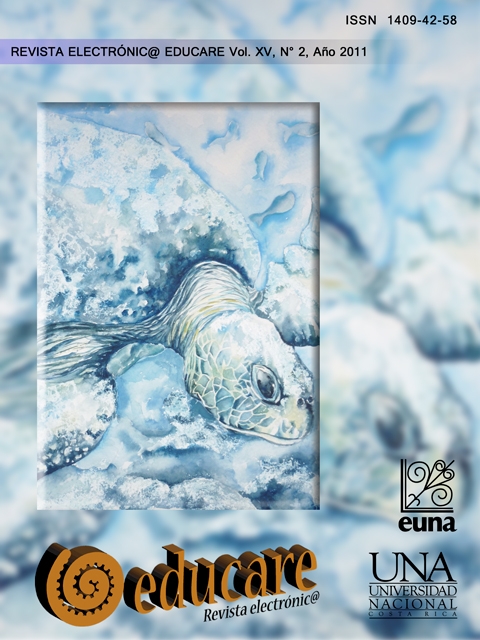Building the Path of Personal and Collective Transformation: the Beginning of an Action-Research Experience
DOI:
https://doi.org/10.15359/ree.15-2.4Keywords:
Action-research, reflection, transformationAbstract
An action-research process is characterized by the participation of different people to find a personal and collective transformation, and by analyzing our own realities to improve them. This paper presents the experience of starting an action-research process, conducted by the author, analyzing her own everyday working practice situation.
References
Amezcua, M. (2003). La entrevista en grupo. Características, tipos y utilidades en investigación
cualitativa. Enfermería clínica, 13(2), 46-117. Recuperado de http://www.portalessa.com.ar/
ARCHIVOS2/metodologia de la investigacion/2cuatrimestre/AMEZCUA-La entrevista en
grupo..pdf
Blández, J. (2000). La investigación-acción: Un reto para el profesorado. Guía práctica para grupos
de trabajo, seminarios y equipos de investigación. (2ª. ed.). Barcelona: INDE Publicaciones.
Dobles, M. C., Zúñiga, M. y García, J. (1998). Investigación en Educación: procesos, interacciones,
construcciones. San José, Costa Rica: EUNED.
Elliot, J. (2005). La investigación-acción en educación. (5a
. ed.). Madrid: Ediciones Morata, S. L.
Freire, P. (2005). La educación como práctica de la libertad. Buenos Aires: Siglo XXI Editores
Argentina.
Freire, P. (2006). Pedagogía de la indignación (2ª ed.). Madrid: Ediciones Morata.
Jara, O. (1994). Para sistematizar experiencias: Una propuesta teórica y práctica. San José, Costa
Rica: Alforja.
Latorre, A. (2007). La investigación-acción. Conocer y cambiar la práctica educativa. (4a ed.). España: Graó.
Olson, M. (s. f.). La investigación acción entra al aula. USA: Aique.
Peralta, M. V. (2004). En construcción de una pedagogía del siglo XXI. Aportes desde Latinoamérica.
Madrid: PIAF.
Starico de Acomo, M. N. (1996). Los proyectos en el aula: Hacia un aprendizaje significativo en
la EGB (2° ed.). Argentina: Magisterio del Río de la Plata.
Toro, J. M. (2005). Educar con “Co-razón” (6a
ed.). España: Desclée De Brouwer.
Downloads
Published
How to Cite
Issue
Section
License
1. In case the submitted paper is accepted for publication, the author(s) FREELY, COSTLESS, EXCLUSIVELY AND FOR AN INDEFINITE TERM transfer copyrights and patrimonial rights to Universidad Nacional (UNA, Costa Rica). For more details check the Originality Statement and Copyright Transfer Agreement
2. REUTILIZATION RIGHTS: UNA authorizes authors to use, for any purpose (among them selfarchiving or autoarchiving) and to publish in the Internet in any electronic site, the paper´'s final version, both approved and published (post print), as long as it is done with a non commercial purpose, does not generate derivates without previous consentment and recognizes both publisher's name and authorship.
3. The submission and possible publication of the paper in the Educare Electronic Journal is ruled by the Journal’s editorial policies, the institutional rules of Universidad Nacional and the laws of the Republic of Costa Rica. Additionally, any possible difference of opinion or future dispute shall be settled in accordance with the mechanisms of Alternative Dispute Resolution and the Costa Rican Jurisdiction.
4. In all cases, it is understood that the opinions issued are those of the authors and do not necessarily reflect the position and opinion of Educare, CIDE or Universidad Nacional, Costa Rica. It is also understood that, in the exercise of academic freedom, the authors have carried out a rogorous scientific-academic process of research, reflection and argumentation thar lays within the thematic scope of interest of the Journal.
5. The papers published by Educare Electronic Journal use a Creative Commons License:














 The articles published by Educare Electronic Journal can be shared with a Creative Commons License:
The articles published by Educare Electronic Journal can be shared with a Creative Commons License: 



